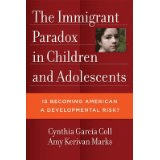“The Immigrant Paradox in Children and Adolescents: Is Becoming American a Developmental Risk?”

“The Immigrant Paradox in Children and Adolescents: Is Becoming American a Developmental Risk?”
Edited by Cynthia García Coll & Amy Kerivan Marks
American Psychological Association
Washington, D.C. 2012
Book is important contribution to the field
Reviewed by Paul Efthim, Ph.D.
Every June, I look forward to The Boston Globe’s report on the valedictorians of the city’s high schools. Year after year, I marvel at the proportion of top students who are immigrants and the latest crop is no exception: 18 out of 39 valedictorians – nearly 50 percent – were not born in the U.S. Five are from Vietnam, four from the Dominican Republic, two each from Nigeria and Haiti, with the remaining students hailing from Albania, India, Morocco, Colombia and Malaysia.
However, the proportion of immigrant students in the Boston public schools, as indicated by the language spoken at home, is only in the 30-40 percent range, according to the latest data available. What explains this disproportionate representation of immigrants at the top of the academic heap?
Scholars have described an “immigrant paradox” along these lines. Children from immigrant families may show better outcomes than predicted by their economic resources, ethnic minority status and status as newcomers in this sometimes inhospitable land. Surprisingly, studies have found that the babies of immigrant women and immigrant adults have better health outcomes (mortality, obesity, longevity) when compared to native born or later generation immigrants.
These patterns contradict the age-old American notion of immigrant succession, in which the first generation struggles, the second generation typically does better and the third generation – the grandchildren of immigrants – outperforms their parents. In fact, the current evidence suggests that this pattern is breaking down.
Two New England psychologists have edited a new book that explores this immigrant paradox in greater detail than ever before. Cynthia García Coll, Ph.D. of Brown University and Amy Kerivan Marks, Ph.D. of Suffolk University brought together 22 researchers from the fields of psychology, sociology, education and economics to look closely at immigrant youth in this country.
Their findings suggest that young people who assimilate rapidly to mainstream “American” cultural practices may, under certain circumstances, experience poorer behavioral and educational outcomes. One of the more robust patterns to emerge across a number of studies is that in general, more highly acculturated youth are more likely to engage in sex and delinquency.
However, the authors point out, the data paint a complex, nuanced picture that defies categorical statements. For example, immigration status tends to increase the risk of poor outcomes in younger children, whereas for older children, being an immigrant who is less assimilated tends to confer an advantage, especially in terms of avoiding risky behavior that native-born peers are more likely to engage in.
The first section of this well-written volume tackles the question of whether there is indeed an immigrant paradox. Later sections look at behavior and health outcomes across generations and family and community factors affecting academic outcomes. A concluding chapter examines the intersection of aspirations and resources in the development of children from immigrant families.
This fine book is an important contribution to the field and will be of interest to graduate students and scholars in developmental and educational psychology, public policy and related disciplines. In the wake of the 2012 election and political debates about immigration, this research offers a timely, welcome antidote to ideologically-driven policy proposals and Tea Party nativism.
Paul Efthim, Ph.D. is a licensed psychologist in private practice in Brookline, Mass. He holds a faculty appointment at the Boston Institute for Psychotherapy and is a candidate at the Massachusetts
Learn more about the book: The Immigrant Paradox in Children and Adolescents: Is Becoming American a Developmental Risk?
